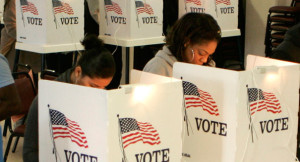>> BY SHOSHANNAH SAYERS, Deputy Director, Southern Coalition for Social Justice On Monday, January 6, 2014 the Southern Coalition for Social Justice will present oral arguments before the North Carolina Supreme Court, urging the court to find that the 2011 redistricting maps are unconstitutional and racially discriminatory.
BY SHOSHANNAH SAYERS, Deputy Director, Southern Coalition for Social Justice On Monday, January 6, 2014 the Southern Coalition for Social Justice will present oral arguments before the North Carolina Supreme Court, urging the court to find that the 2011 redistricting maps are unconstitutional and racially discriminatory.
During the summer 2013 trial, the Southern Coalition for Social Justice represented several statewide nonpartisan groups seeking to overturn racially-packed voting districts in North Carolina in the consolidated cases Dickson v. Rucho and NAACP v. NC. On July 8, 2013, shortly after the U.S. Supreme Court gutted the Voting Rights Act, a three-judge panel in North Carolina state court unanimously >>rejected all challenges to the 2011 redistricting plans for Congress, State House and State Senate. You can read the full lower >>Court Decision here.
SCSJ has argued that redistricting maps were racial gerrymanders, unfairly dividing the state into “black districts” and “white districts,” in violation of the U.S. Constitution and the state constitution. In doing so, the ability of minority voters to participate equally in the political process was intentionally limited.
SCSJ also argued that the plans violated the North Carolina constitution’s demand for geographically compact districts. The enacted plans contain districts that are grossly non-compact and split far more precincts than prior or alternative plans.
Post-election analysis conducted by the Southern Coalition for Social Justice and presented at trial showed that the 2011 redistricting plan placed one in four North Carolina voters into “split precincts,” leading to widespread confusion about who would be on the voter’s ballot on Election Day and resulting in the actual disenfranchisement of thousands of voters. These districts also placed a difficult burden on elections officials, who often struggled to assign voters living in split precincts to the correct districts. Across the state, thousands of voters assigned to the wrong district received the wrong ballot on Election Day. Since women make up >>53.7% of North Carolina’s registered voters, it stands to reason that women were over-represented among the thousands of voters receiving the wrong ballot as a result of flawed redistricting.
At the Supreme Court level, our arguments are augmented by three amicus briefs, two by prominent legal scholars and one by an enterprising law student. The amicus briefs, as well as our response brief and request for a temporary restraining order to keep the discriminatory districts from being used in 2014 elections, are available below.
>>Amicus Brief 1
Amicus Brief 2
Amicus Brief 3
Plaintiff-Appellants’ Reply Brief
Motion for Temporary Restraining Order
What year was this pic taken? It’s for a project.